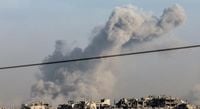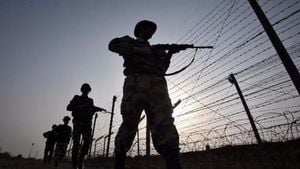As the world’s attention turns once again to the Gaza Strip, the region endures another wave of violence and humanitarian catastrophe, with the latest Israeli airstrikes killing more than 50 people since dawn on September 20, 2025, according to Gaza officials. The majority of these casualties—at least 40—occurred in Gaza City, which has become the epicenter of recent attacks. Among the dead were Majed Abu Salmiya and several of his children, whose home in the Shati refugee camp was struck in one of the deadliest incidents of the day. In a separate attack, Israeli warplanes killed at least six people in the Al-Mashahra area of the Al-Tuffah neighborhood, northeast of Gaza City. Further south, near Rafah, Israeli gunfire killed one person and wounded several others close to an aid distribution center, as reported by local sources.
The relentless bombardment comes amid what officials describe as a systematic Israeli campaign to seize control of the territory and forcibly displace its population. The Euro-Med Human Rights Monitor reported that the Israeli army is carrying out the equivalent of 17 car-bomb explosions every day in Gaza City. In the past week alone, approximately 120 such blasts have been documented in residential neighborhoods, leaving entire communities in ruins. The Gaza Government Media Office stated that Israeli forces are imposing the forced displacement of about 270,000 Palestinians from Gaza City to the south, even as more than 900,000 people remain in Gaza City and the northern strip, refusing to abandon their homes despite the intensity of the attacks.
Conditions for civilians are growing ever more dire. The so-called “shelter zones” designated by Israel in southern Gaza cover no more than 12 percent of the territory’s total area, yet authorities are attempting to cram over 1.7 million displaced people into these limited spaces. Since the conflict escalated in October 2023, over 65,000 Palestinians have been killed and more than 166,000 injured, many of them women, children, and aid workers. Entire neighborhoods have been flattened, and vital civilian infrastructure—including hospitals, schools, water systems, and bakeries—has been systematically destroyed. Gaza’s 2.2 million residents face dwindling access to food, clean water, and medicine, creating conditions that United Nations officials have described as a “nightmare scale” humanitarian crisis.
Against this backdrop of devastation, diplomatic efforts are underway to address the deepening crisis. On September 21, 2025, Qatar’s Emir, Sheikh Tamim bin Hamad al-Thani, departed for New York to attend the United Nations General Assembly. The high-profile event comes at a crucial moment, as the world grapples with increased geopolitical tensions and the nearly two-year-long conflict between Israel and Hamas continues to escalate. According to Devdiscourse, the worsening situation in Gaza—with famine and severe food shortages expected to rise by the end of September—has prompted urgent calls for a global humanitarian response. Global hunger monitors warn that the region could see a dramatic rise in famine by month’s end unless immediate action is taken.
Yet, efforts to deliver aid to Gaza’s beleaguered population have themselves become a flashpoint. On September 20, 2025, Israel accused Hamas of firing upon a United Nations team preparing a new humanitarian corridor in southern Gaza, forcing the workers out and using a stolen UN vehicle to block the route. The Coordinator of Government Activities in the Territories (COGAT) said the corridor was intended to allow aid trucks to travel from the Kerem Shalom crossing into a designated humanitarian zone, delivering food, medical supplies, tents, and shelter equipment to families displaced from Gaza City. Israel characterized the attack as part of a broader pattern of sabotage by Hamas. Earlier in the week, UNICEF reported that armed men hijacked four aid trucks carrying baby formula at gunpoint, leaving 2,700 infants without vital nutrition. Israel allows the entry of baby formula and other humanitarian goods, but accuses Hamas of stealing them to resell for profit.
“Hamas proves again and again it has no interest in the welfare of Gaza’s residents,” said Maj. Gen. Ghassan Alian, head of COGAT, in comments reported by multiple outlets. “Even when Israel works with the UN and international groups to expand humanitarian aid, Hamas desperately tries to sabotage it. They abandon the people they claim to represent in order to ensure their own survival.” Alian condemned the attack on UN workers and vowed that Israel “will not allow Hamas to create false narratives of a crisis in Gaza,” pledging that Israeli authorities would continue coordinating humanitarian deliveries with international partners.
The incident has further complicated the already fraught efforts to get aid into Gaza, as both sides trade accusations over responsibility for the worsening crisis. Israel maintains that it is allowing humanitarian goods into the territory and blames Hamas for obstructing distribution and exploiting the suffering of civilians. Palestinian officials and humanitarian groups, meanwhile, point to the destruction of infrastructure, ongoing bombardment, and severe restrictions on movement as the primary causes of the deepening catastrophe.
International observers warn that the situation is spiraling out of control. The blockade, ongoing violence, and attacks on aid convoys have left Gaza’s residents on the brink. The United Nations and other agencies have repeatedly called for an immediate ceasefire, unfettered humanitarian access, and a durable political solution to the conflict. But with diplomatic channels strained and trust at an all-time low, prospects for a breakthrough remain uncertain.
As the United Nations General Assembly convenes in New York, global leaders face mounting pressure to address the humanitarian disaster unfolding in Gaza. The international community is being urged to move beyond rhetoric and deliver concrete assistance, lest the region slide even further into chaos. With famine looming, infrastructure in ruins, and the death toll mounting, the people of Gaza wait anxiously for relief—and for a path toward peace and security that has long eluded them.
In the midst of devastation and political maneuvering, the struggle for survival continues in Gaza. Every day brings new casualties, new displacement, and new challenges for those trying to provide help. The world watches, hoping that this time, urgent action will follow the urgent need.





